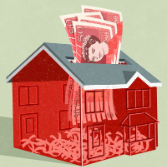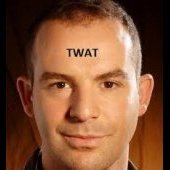All Activity
- Past hour
-

Property crash, just maybe it really is different this time (Part 3)
Wight Flight replied to spunko's topic in Property Prices & Economy
Yes. But i don't know how big. But it makes no odds. Had they bought with cash they are now losing a lot of potential interest. -

Property crash, just maybe it really is different this time (Part 3)
JoeDavola replied to spunko's topic in Property Prices & Economy
Do you know that they bought with a mortgage? -

Property crash, just maybe it really is different this time (Part 3)
Wight Flight replied to spunko's topic in Property Prices & Economy
I am wondering how smug the people that bought my last place are feeling now? They bought it for £500k as a holiday home, their logic being they usually came for the whole of August anyway (when the Fulham crowd descended) and the interest on their mortgage wouldn't be any more than the £8k they spent on their holiday rental. Oops. -

Property crash, just maybe it really is different this time (Part 3)
JoeDavola replied to spunko's topic in Property Prices & Economy
Actually come to think of it…at 6% the mortgage council tax and building maintenance fee on my hovel is 35% more than I pay in rent. - Today
-

Property crash, just maybe it really is different this time (Part 3)
Wight Flight replied to spunko's topic in Property Prices & Economy
Not at all. It is just a little two bed place but its value went mental with lockdown. -

Property crash, just maybe it really is different this time (Part 3)
JoeDavola replied to spunko's topic in Property Prices & Economy
DOSBRAG -

Property crash, just maybe it really is different this time (Part 3)
Wight Flight replied to spunko's topic in Property Prices & Economy
Possibly. If so, if I was to buy my little house here is would cost me £36k a year in interest alone. I think I will stick with renting for now. -

Credit deflation and the reflation cycle to come (part 9)
Axeman123 replied to spunko's topic in Property Prices & Economy
I would argue before even that the unit of account/trade was obligation. A farmer would store his excess food production "in" his children during his best producing years, so that they would feed him their excess production from their best producing years etc. Farmers having a good year would be expected to help out those having a bad one via alms or whatever, and would probably be related anyway. The fuedal obligations to a lord etc were and extension of this. They key thing however is that this all rested on personal relationships, and the verifiable balance of individuals putting in vs taking out even if there wasn't a formal accounting etc. That set a hard limit on scaling up, and money became an alternative mental model. -

Credit deflation and the reflation cycle to come (part 9)
Mapper replied to spunko's topic in Property Prices & Economy
I should have thought about the metaphor a little more! -

Property crash, just maybe it really is different this time (Part 3)
JoeDavola replied to spunko's topic in Property Prices & Economy
Oh I’m not expecting it to affect house prices in much of the uk, just want an idea of what those who do need mortgage debt in the uk should be pricing in long term - seems likely it’s 6%. -

Credit deflation and the reflation cycle to come (part 9)
Harley replied to spunko's topic in Property Prices & Economy
Here's a comparative thought experiment on value and money. What "value' does your spouse bring to you? Maybe: . Makes life easier in that the chores are shared (division of labour) . Provides emotional support when you need it . Brings in extra income to deploy elsewhere . Provides sexual fulfillment from and maybe fufillment in the giving . Provides companionship and/or a means to express yourself . Provides apparent (not yet realised) future security (e.g. look after you) . Provides additional information on things and a more productive pov . You like or have a perceived duty to confirm to societal, cohort, etc norms . Provides you with a means to satisfy judged undesired urges like control . How incomplete is such an analysis, what things are missed? . Etc Now how much have you given up to attain that value (you have traded freedom/rights for a greater benefit)? Aka a social contract. Now permeant is the construct? And is your spouse not just a form of "money" in that you have made a particular investment/commitment but could equally, better, or worse get this combined value from another? "Combined value" so what sort of implicit trade offs are taking place between values and do they change? But you stick, sometimes too long, with the "current thing". Why? What apparent value or other thing (uncertainty) is holding you back from change? And so on. Now think about your relationship with money. Me, I love my spouse more than money. So what.........? Will I ever find out or will the mere pursuit itself add value to me? Is all of it ultimately relationships to extract personalised value with the relationship being the key to study to better comprehend the nature of the value? Technobabblist would now seek to contruct a optimised (ideally finite) utility function! -

Property crash, just maybe it really is different this time (Part 3)
Wight Flight replied to spunko's topic in Property Prices & Economy
Logically yes. Inflation at 2%, base rate at 4%, mortgage rate at 6%. But logic doesn't apply where house prices are concerned. -

Property crash, just maybe it really is different this time (Part 3)
JoeDavola replied to spunko's topic in Property Prices & Economy
Is it fair to say that these mortgage rates rising up slowly (seem to be almost 6% according to the media) are an indicator that this is absolutley is the 'new norm' and that they're not expecting a return to low interest rates in the future - or is it more complex than that? -

Credit deflation and the reflation cycle to come (part 9)
Harley replied to spunko's topic in Property Prices & Economy
Concepts which underpin the thoughts/debates of Locke and many co on the evolution and basis of society such as "mutual self interest", the Social Contract, Property Rights, etc. These "justify" the rule of law for some and hence, as "money" is a standard against which to asses the "current thing" (ie. fiat as a proxy), so could these be a standard for societal governance against which we can see the egregious over-reach of that particular "current thing". -

Credit deflation and the reflation cycle to come (part 9)
Harley replied to spunko's topic in Property Prices & Economy
One of the best things you've posted! Lovely. Reminds me how much I enjoy engaging with the likes of Napier. Proper economists with a respect for the lessons of history, etc rather than the current technobabble. Library of Mistakes......! -

Credit deflation and the reflation cycle to come (part 9)
onlyme replied to spunko's topic in Property Prices & Economy
If we had let the reckless banks go bust they would have much less power and influence to get governments to push crap and benefit from things likes carbon credits. I think there are much wider questions in regards the malign influence of the banking sector in general in regards what they will do to make money, tilt the tables and generally now not benefit the overall economy. https://www.bloomberg.com/news/articles/2023-12-10/wall-street-banks-look-to-carbon-offsets-for-new-profits -

Credit deflation and the reflation cycle to come (part 9)
sleepwello'nights replied to spunko's topic in Property Prices & Economy
A very neat exposition. Also money gives an insight into a persons personality. The givers, the takers, the greedy, the spendthrift, the frugal, the miserly. Again the real problem is people with their emotions and tempraments. -

Credit deflation and the reflation cycle to come (part 9)
Harley replied to spunko's topic in Property Prices & Economy
You get taught about the characteristics/properties of "money" in about the first week of economics. Interesting to take time out and use these to evaluate the progress of the current proxy. For example: . "Store of value" = "Declining store of value". . "Transferability" = "Transferability if we like you". ....and so on. Not a good report card. Act accordingly? -

Credit deflation and the reflation cycle to come (part 9)
Axeman123 replied to spunko's topic in Property Prices & Economy
What is money? Money is a useful fiction that only works as long as people beleive a complex web of contradictory things about it - and in that way it is like the nation state. When both maintain confidence they can motivate millions to cooperative efforts and raise living standards to an incredible degree, and yet both always fall when the elite they create get greedy. -
Credit deflation and the reflation cycle to come (part 9)
baffledbyzirp replied to spunko's topic in Property Prices & Economy
The subject is confusing and far easier to view from a micro perspective. According to classical economic theory, trade took place originally by way of barter which was inefficient since the transaction required 'a coincidence of wants' i.e. if I had eggs and you had milk both parties to the trade would need what the other was offering to do a deal. Money is supposed to have emerged as a means to facilitate trade. In the past cattle, pelts, salt, wampum seeds, exotic feathers and sea shells, human beings, skulls, gem stones, tulip bulbs, tea, camels and in the case of the Yap people, huge limestone disks, have all served as money. There is no mechanism for establishing the original value of money so economists assume a benevolent overlord and fudge the explanation of origination. According to Aristotle money has key characteristics; portability, fungibility/ rarity, divisibility, durability. Hey presto money is a proxy by which other goods can be acquired. It allows individuals to accumulate their wealth and provide for the future from historic endeavour. In theory all vey good but in practice anthropological studies have never discovered any civilisations that used the barter system exclusively. Credit has always been employed. Thus all exchange has relied on trust between transacting parties. Crucially there is no need to acquire more than you or your family could feasibly consume because excessive wealth would encourage others to dispossess you in primitive contexts. The problem arises when we move from an absolute physical ledger to paper money authorised and controlled by the state. In his book The Ascent of Money, Niall Fergusson described paper money introduced in China on tree bark and used for paying taxes. The value of notes was inflated away over time because of forgery even though possession of forged notes was punishable by death. The trust element is subject to fraud and misrepresentation. The forgers today are central banks who decoupled paper currency from real assets in 1971 and have subsequently debauched the petrodollar by spending what they don't have on pointless self-defeating wars. Aristotle's second criterion has been abandoned. The only restraint now on liquidity is the margin requirements stipulated by government of the banks. The Basel rules were an attempt to control excessive credit creation, but given the size of derivatives market and the paucity of oversight and enforcement the risks have not been managed effectively. What we call money is now just fantasy dollars issued by bankrupt governments and rehypothecated endlessly by financial institutions working tirelessly for their own inevitable destruction. There is no longer a kill switch. Doctor Faustus is a play about generating paper money whose value is derived not from the gold held at the treasury but under ground. There is nothing new to what we are experiencing today other than the global scale of the impending default as per the French experience with Consuls and Mississippi land courtesy of John Law. The strength of official denial is positively correlated to the weakness of the system. One goes we all go. Cameron's pledges are meaningless agitprop. -

Credit deflation and the reflation cycle to come (part 9)
M S E Refugee replied to spunko's topic in Property Prices & Economy
I've just pointed out to the sycophantic Gary's Economics fans, that he has benefitted greatly from wealth inequality, because he should've been out of a job instead of making tons of cash as his employer, Citigroup were bailed out by the tax payer in 2009. -

Credit deflation and the reflation cycle to come (part 9)
Harley replied to spunko's topic in Property Prices & Economy
Morning! Lovely day ahead! Agreed, as far as it goes. This, allied as it is with "value", is a massively broad and deep topic. Most commentators are working at a superficial level and therefore don't do it justice. You have to go back to the original thinkers behind economics like Smith, Locke, and co. This is the root of true economics, not the technobabble that passes as economics these days which causes so much harm by detaching the dialogue from these roots. IMO the most productive path is to keep asking "so what" as you primarily think about value (money only being one sub topic/derivative). That enlightened dialogue takes you to some very interesting and (this is key) practical places. To repeat myself, the last lot of original thinkers like Smith were a product of a period of great change. A redefinition of the "as-is" world. Arguably we're at another such point. MMT and the like are a stab, but a pathetic one as we have come to expect from our current lot. PS: Your long held premise that "money" can be in part saved labour is beautiful and a lovely starting point to dig down from. A moment's attention should stimulate much thought and practical focus, rather than just an academic exercise. That is, its debasement fecking pysses me off to do something! PPS: By "money" I mean the current proxy (i.e. our debt based fiat) as "money" is a comparative standard (yardstick) which gets expropriated to give unfounded authenticity to the "current thing". A somewhat subtle but important distinction. -

Credit deflation and the reflation cycle to come (part 9)
Harley replied to spunko's topic in Property Prices & Economy
OMG, people other than me have started to talk about value!!!!! I'm developing a Sage complex! -

Credit deflation and the reflation cycle to come (part 9)
Harley replied to spunko's topic in Property Prices & Economy
My log stores wish to disagree! But I do agree! -

Credit deflation and the reflation cycle to come (part 9)
DurhamBorn replied to spunko's topic in Property Prices & Economy
Money is the means to exchange all saved labour (real assets are also saved labour) ever produced in that Fiat currency at their preset value.As long as the supply of it goes up 1%pa but human effort and access to the earths resources increase 2% living standards improve.At the moment we are creating around 4% extra units a year in the UK ,but human effort and production is flat to slightly falling so living standards are falling by around 4%+a year as we consume past effort.However in the UK due to inflation protecting bennies and public sector pensions the whole loss of spending power is falling on a much smaller part of the population,and on my numbers the productive are falling around 6.8% a year behind the none productive.I call it a "distribution cycle" as government uses the printing to distribute others saved labour through inflation rather than direct tax.Many assets rise because they hold their value against the rising currency units ,gold of course the easy example,but to really be sure to keep ahead you need to hold assets that can leverage the extra currency units.Its why i like EM leaning asset managers,because even if wages are rising less than inflation contributions to pensions increase simply due to extra units and it leverages their profits.Turning from dis-inflation to inflation will slowly destroy lots of business models.Coffee shops a thread example this week.It also helps some areas.However the reverse is true once the inflation cycle ends,and then most of our holdings would suffer huge pain,and likely quickly.Its why spotting cycle turns makes such a huge difference to increasing net wealth.Luckily we got this huge cycle turn correct,when very very few did,so we made huge profits.The irony is i found that easy,the numbers were clear.This stage now is very dangerous,because the population are angry,and polos will look for direct theft,and more freezeing allowances inflation theft.





